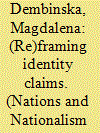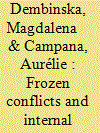| Srl | Item |
| 1 |
ID:
114094


|
|
|
|
|
| Publication |
2012.
|
| Summary/Abstract |
How do we account for the reinforcement of identity particularisms despite transnational integration? This paper addresses the question by comparing two ethnolinguistic groups, Silesians and Kashubs in Poland. It is argued that in order to obtain state protection and tools to develop and survive, ethnic entrepreneurs adjust to institutions and discourses. Census politics, state laws' elaboration, transnational institutions represent openings to which groups adjust by reframing identity claims. In doing so, they re-imagine and reinforce their communities. Following Rogers Brubaker, group-making is presented as an eventful process where ethnic elites invest identity categories with groupness by taking advantage of opportunity windows at hand. Further, tracing changing political opportunities, strategic adjustments and groups' boomerang effect bid, the paper embeds identity groups within the social movement literature.
|
|
|
|
|
|
|
|
|
|
|
|
|
|
|
|
| 2 |
ID:
155320


|
|
|
|
|
| Summary/Abstract |
The complex architecture of fragmented authority in the international system remains under-theorized. Understanding the world of separatist regions that turn into de facto states is high on the research agenda. While patron states are said to be a necessary condition, we argue that it might not be a sufficient one to explain the varying degrees of survival/endurance of de facto states. This analytical essay is an effort to establish directions for research that would better account for the variation among cases by integrating their internal dynamics with what we already know about the role of external factors. Adopting a political sociology perspective, this article focuses on understudied aspects of internal processes and points to the role of local elites in state and nation-building during civil wars and after violence declines. We contend that such a perspective helps to account in a more comprehensive way for the processes underlying the status quo while, at the same time, analyzing the interplay between external and internal dynamics of frozen conflicts. We show that students of de facto states would gain from employing literatures on state-building and nation-building to articulate an analytical framework that would reassess the role of local elites in building a state and a nation, and analyze the societal (un)responsiveness as well as the strategies of passive or active accommodation, resistance or opposition within de facto states' populations.
|
|
|
|
|
|
|
|
|
|
|
|
|
|
|
|